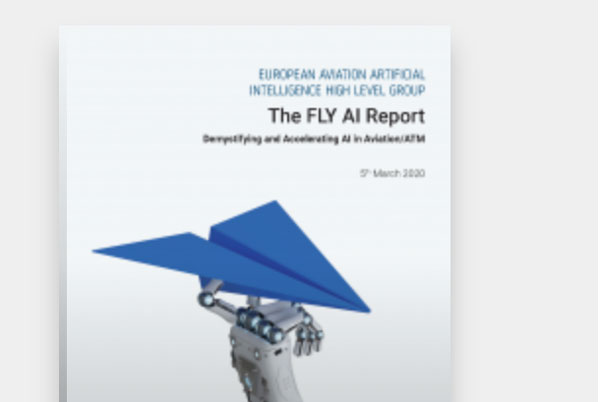
Artificial intelligence (AI) is already starting to transform how the world lives and works, and the pace of AI deployment is rapidly accelerating in all sectors, particularly in aviation.
The European Aviation High Level Group has published a new report into this subject matter, which aims to “demystify and accelerate” the current use and future potential of AI in aviation.
The first edition of the report, titled ‘FLY AI’, pools the expertise of EUROCONTROL and a wide range of key representatives from all aviation sectors, including airlines, airports, Air Navigation Service Providers, manufacturers, EU bodies, military and staff associations.
It aims to advance understanding among aviation and air traffic management (ATM) staff of AI and its potential, and to help accelerate its uptake in aviation. It concludes that there are a number of practical actions that could be taken to accelerate the development of AI in European aviation and ATM, which form the basis of a ‘FLY AI Action Plan’.
Adina Vălean, European Commissioner for Transport, commented: “With European aviation facing growing pressure to reduce its environmental impact, as well as persistent capacity bottlenecks, we need more sophisticated changes on the ground and in the air, and quickly, if we want to accommodate sustainable traffic and passenger growth. Artificial intelligence can be a key ally in pursuit of this goal. This report can be seen as a catalyst. It should focus efforts and spur innovation so that we may overcome the main challenges facing the industry, and improve the passenger experience in a safe and resilient manner while adhering to ethical principles.”
The report finds that AI has huge potential for use in areas where it can reduce human workload or increase human capabilities in complex scenarios, for instance to support air traffic controllers (ATCOs), Air Traffic Safety Electronics Personnel (ATSEP), pilots, airport operators, flow controllers or cybersecurity officers.
Moreover, AI will also play a fundamental role in driving the development of new ATM/U-space services, as new airspace users, such as high-level vehicles and low-level drones, seek to enter an already busy and complex airspace. AI will also increase safety and cyber resilience through the provision of new conflict detection, traffic advisory and resolution tools.
In particular, AI will enable better use of aviation data leading to more accurate predictions and more sophisticated tools, increased productivity and enhanced use of scarce resources, for instance in terms of airspace, runways and staff, helping to tackle both capacity and the environment, the two most significant challenges facing European aviation today.
The report recommends that more needs to be done to harness the full potential of AI to ensure the breakthrough required for this technology in aviation and ATM. With many airlines and airports embarking on digital transformation journeys, increasing our understanding of how AI can generate business and society is key to building its usage and enlarging expertise.
The ‘FLY AI Action Plan’ suggests a number of practical measures designed to help advance the use of AI in the aviation and ATM sector, including work on a federated AI infrastructure, more AI research and development in key ATM areas, such as safety, cyber, operations both safety-critical and non-safety-critical, a focus on fostering the emergence of an AI culture through training and upskilling of staff across enterprises, more partnerships with other digital innovation hubs, AI specialists and other industrial sectors, and continued experience/knowledge sharing, communication and dissemination.
Eamonn Brennan, Director General, EUROCONTROL, said: “This ‘FLY AI’ report provides a comprehensive overview of the various ways in which AI and machine learning are already contributing to a wide spectrum of value opportunities in our industry, with an extensive list of current initiatives in the sector. It puts into context the progress that we have made already and demonstrates that by joining forces, we will be in a position to demystify and accelerate AI development and unlock its potential for the benefit of the whole community and the European Network in particular. No one party was responsible for this report, it was a big team effort and my thanks go to all experts from the various organisations involved – the European Commission but also ACI-Europe, Airbus, ASD, CANSO, Heathrow Airport, Honeywell, IATA, IFATCA, IFATSEA, the SESAR Joint Undertaking, Thales, as well as our military partners EDA and NATO.”






